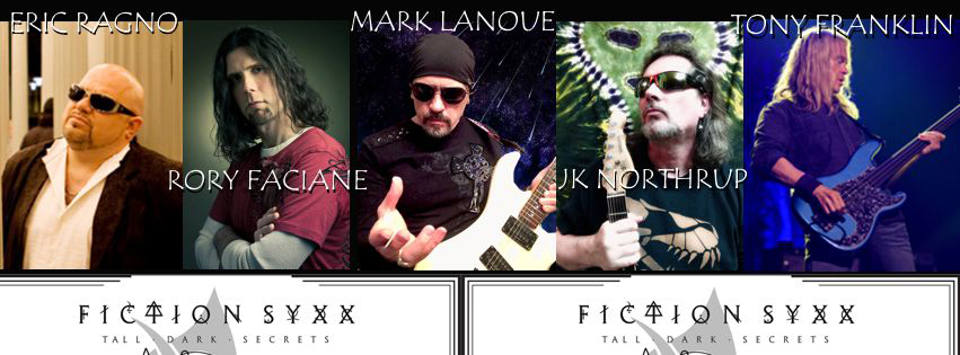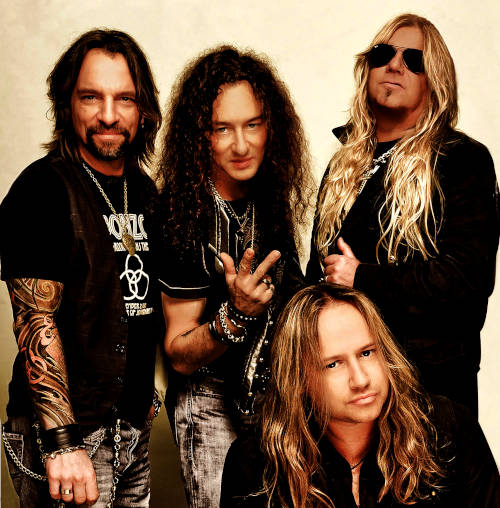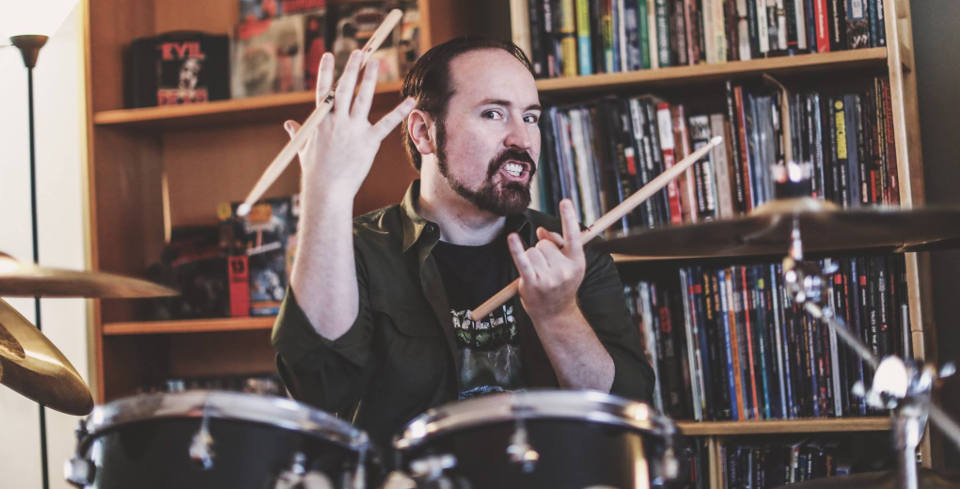
by Alexx Calise
— Columnist —
Meet the multitalented, inspiring and formidable force that is Dan Hegarty. The New York native has been plugging away for almost a decade in the copyright licensing department of Concord Music, an independent, worldwide leader in development, acquisition, and management of recorded music, music publishing, and theatrical performance rights. When he’s not busy handling royalties and licenses, he’s drumming in a series of LA-based bands including Cliff Burton-era Metallica tribute band, Cliff ‘Em All, and video game music project, Naju. He’s also just released several singles for his solo project, Conflict One Zero, which echoes some of the underground 90’s era Industrial bands like Diatribe, 16 Volt and Machines of Loving Grace. Hardrock Haven’s Alexx Calise took a moment to chat with the music industry vet in between his multitude of projects.

HRH: You’ve been in the copyright licensing department at Concord Music since 2014. What does your job entail?
Dan: I have actually been in the department since 2009 but I’ve been the Manager of Copyright Licensing and Royalties since 2014. My job has evolved over time but in a nutshell, I’m responsible for licensing and paying mechanical royalties on the CD, vinyl, and permanent download (iTunes/Amazon/Walmart/Target/etc) products released by the label. Concord Music is the parent company and there are many individual labels under that umbrella – well over 20, possibly more. One of the other big responsibilities is making sure that all of our vendor information is up to date because, like most labels, the company is bound by strict IRS regulations regarding the payment of royalties. I’m also responsible for supervising and training the interns and any temp employees that we get for our department.
HRH: What is the difference between a mechanical and synchronization license?
Dan: Mechanical licenses are strictly for audio-only products in a fixed format. For example, say your band wants to record a cover song and sell it on your original CD/vinyl/digital download album. You will need a mechanical license from the music publisher who owns the composition in order to sell that recording legally. The rate for mechanical licensing is protected and set by United States copyright law, so it’s consistent for any music that you’d like to license. Longer playing times (over 5 minutes) cost a little bit more but it’s the same price for a very popular song or an obscure deep cut. Synchronization licenses are for the use of a song in conjunction with visual images – films, TV shows, video games, etc. Synch licenses are 100% negotiable – you can get them for very little money or whatever the music publisher wants to charge. There are no government regulations regarding synchronization licenses. Something else to know about all this is that the synchronization license DOES NOT cover the use of the actual recording of the song – just the composition. You need a master use license for the actual recording as well, which is the reason why you hear so many cover versions of songs in popular TV shows and commercials. Many times, an artist will be hired to provide the recording of the song to try to save money on a potentially expensive master license by the original artist – especially if it’s a song by a really famous artist.
HRH: Does Concord scout for new talent these days, or are they concentrating primarily on their existing catalog and legacy artists?
Dan: Concord is such a diverse company at this point that it’s doing both of these things and more. Labels such as Fearless, Loma Vista, Rounder and Razor & Tie are all out there actively recruiting new talent. We have a division called Craft Recordings that specializes in legacy artists and catalog and Fantasy which actually releases music by developing artists AND legacy acts. We also acquired Varèse Sarabande, which specializes in score albums from current and existing films and TV shows.
HRH: In the event that you can’t get a hold of an artist, or there are disputes between band members regarding ownership, what do you do with unallocated royalties?
Dan: This is actually a very common problem and the short answer is…it’s complicated. (Laughs) I can tell you some basic issues and standard practices. There is a serious amount of liability that record labels take on with accounting for royalties, especially mechanical royalties. Unallocated royalties are put on hold in a type of escrow account and it’s a problem for record labels because they are still liable for that money even if they don’t know whom to pay. Unallocated royalties can be held against a company’s profits and liquid assets. It’s a BIG problem if those royalties do not get paid and then someone comes along years after an album comes out and wants to know what happened to their money. Anyone working in royalties has to have a paper trail showing all of the steps that were taken in order to contact an artist or songwriter because that can present a very serious legal issue for the company. In most cases, a label will try to reach an artist through their management, attorneys and business representatives first. If that doesn’t work, the public search for contact information begins. ASCAP and BMI have public databases that have some contact information but members can choose to be listed privately, which means that you can’t reach the members directly but you can contact those organizations and tell them that you are trying to contact their members. Those two organizations are very good about reaching out to their songwriter and publisher members when companies are trying to locate them for payment purposes. Songwriters, publishers, and artists themselves… are a mixed bag. I’ll leave it at that. As far as disputes about song ownership (something I deal with A LOT in my role), the most common practice is that the label will issue a dispute notice to all parties involved, telling them that no one is getting paid until they sort out the particulars and everyone involved signs off on it. This can happen very quickly or take years, depending mostly on the relationship between all parties involved.
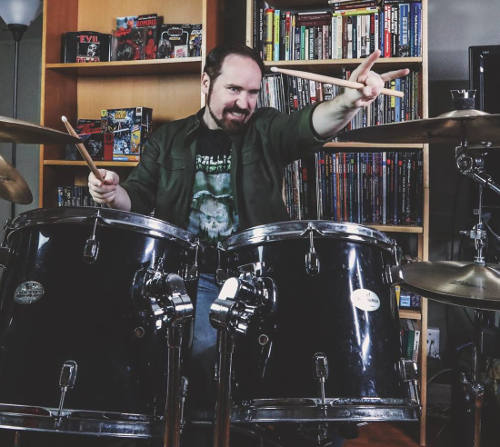 HRH: Which kind of license do you need to acquire if you want to record and distribute a cover song?
HRH: Which kind of license do you need to acquire if you want to record and distribute a cover song?
Dan: A mechanical license will take care of a cover song and you can license most commercially-released songs through The Harry Fox Agency. Some publishers issue licenses directly and you can find their contact information through ASCAP, BMI, and SESAC. There’s always Google if you get stuck as well.
HRH: In addition to working in the music industry, you also teach drums. What would you say is your favorite age group to teach, and who tends to be the most excited/retain the most information?
Dan: I love teaching everyone but each age group comes with its own set of challenges and benefits. There are three groups that make up most of my drum classes at LACC – teenagers/young adults, late 20s-mid 30s working professionals, and retired people. The younger students are really excited about music and it’s fun to watch them discover the secrets of the instrument. The working professionals know how hard it is to learn a new skill but at the same time, they tend to put in the most work and retaining the most information. The retired folks are almost always the most excited people in the class because they’ve been waiting their whole lives to play the drums.
HRH: You’ve been hard at work with your solo music project, Conflict One Zero. I definitely hear some 90’s industrial influences in there; maybe some Ministry and Skinny Puppy (awesome!). Am I completely off base? It’s definitely a departure from what I’ve heard from you in Cliff ‘Em All and Cobra Venom.
Dan: You’re definitely in the ballpark. KMFDM and Nine Inch Nails were the bands that got my journey into the industrial music world started. Just about all the bands on The Crow and Mortal Kombat soundtracks ended up in my collection at some point. I also had a roommate in college that turned me on to the more electronic industrial acts like VNV Nation and Velvet Acid Christ. Without Ministry, NONE of those bands happen, so Conflict One Zero is indebted to them by default. Industrial music also nurtured my fascination with other types of electronic music artists like Prodigy, Underworld, BT and Aphex Twin. Once my ears were worn out by all that stuff I got into softer trip-hop groups like Portishead, Massive Attack, Amon Tobin and Baxter. I’ve had a great time playing drums in my metal bands but I really wanted to draw from ALL this stuff for Conflict One Zero, and I feel like the C1Z sound palette has expanded greatly between “Activate” and “Battleground.”
HRH: Are you going to do any more of the Music Chamber podcasts with Charlie Waymire at Ultimate Studios? You guys have featured so many talented under the radar artists, including some GHS artists like Rob Leines and (ahem) Batfarm.
Dan: Charlie and I are still deciding what’s next for The Music Chamber. We had a great experience with artists like Rob, Batfarm, Little Empire, VK Lynne, and several others but like most shows, it ended up becoming a lot more work than we’d anticipated. LOL! It was a lot of fun and we definitely met a lot of great artists and people through the experience but the trick now is finding a way to do the show in a way that is sustainable for us, beneficial to the artists, and serves their audiences and our own.
HRH: You’re so natural and speak so eloquently on camera/on your podcasts. Did you grow up listening to Howard Stern or any of these other larger than life radio personalities?
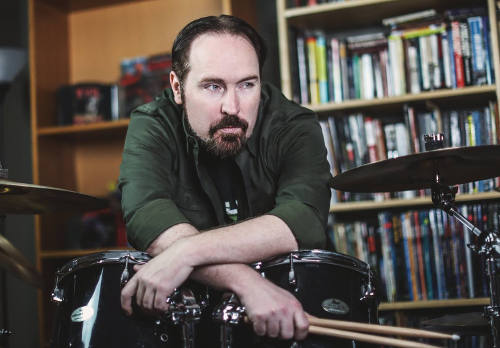 Dan: Howard Stern is by far my biggest influence in terms of any hosting or public speaking that I do. The thing I love best about Howard is that he has a way of making his guests the stars of his show. It’s HIS show and he’s the star – but he’s gracious and supportive of the people that he brings on for interviews. Even when he’s goofing on the crew of the show he gets into what’s going on in their jobs and their lives. I was also a big fan of Headbanger’s Ball and I loved Riki Rachtman’s interview style as well. Whenever he had bands on the show it always felt like a conversation and not a Q&A session – something I strive to do on The Music Chamber and The Loudmouth Report, which is the podcast I do with writer/director Tennyson Stead. I love Bill Burr and Joe Rogan as well. Their podcasts are the ones that really made me want to do one of my own.
Dan: Howard Stern is by far my biggest influence in terms of any hosting or public speaking that I do. The thing I love best about Howard is that he has a way of making his guests the stars of his show. It’s HIS show and he’s the star – but he’s gracious and supportive of the people that he brings on for interviews. Even when he’s goofing on the crew of the show he gets into what’s going on in their jobs and their lives. I was also a big fan of Headbanger’s Ball and I loved Riki Rachtman’s interview style as well. Whenever he had bands on the show it always felt like a conversation and not a Q&A session – something I strive to do on The Music Chamber and The Loudmouth Report, which is the podcast I do with writer/director Tennyson Stead. I love Bill Burr and Joe Rogan as well. Their podcasts are the ones that really made me want to do one of my own.
HRH: I’ve always loved about you is that you’re constantly trying to better yourself as a musician, educator and human being. Tell us a little bit about the film scoring certification program you’re taking at UCLA extension. Which classes have you enjoyed the most, and more importantly, how do you fit all this stuff into your schedule?
Dan: Enrolling in the Film Scoring Certificate program at UCLA Extension is one of the best decisions I have ever made. It’s a program for working people so the classes are usually at night or on weekends and all of the instructors are accomplished composers, musicians, and professionals. The program and instructors know that everyone’s time is valuable and the goal is to provide students with the knowledge that they need to actually work in this business. It’s hard to pick a favorite class but the hardest and also most satisfying course I’ve taken so far was the Orchestration class. I never thought I’d get the chance to write for string quartets, woodwind ensembles, and harp players because I had the hardest time ever with music theory, harmony, and notation in my younger years. Fortunately, my life in music and the right teachers made a big difference. I also owe a big debt of thanks to Stewart Jean at PIT/Musicians Institute. Without his ear training and harmony/theory courses, I never would’ve made it into this UCLA program or had any kind of success with it. As far as scheduling goes, music is still the most important thing in my life. When something is this important to a person, they find a way to make it happen. I chose this program because I’m still able to work at Concord, play/teach music, develop Conflict One Zero and do my podcasts while maintaining the academic commitments (classroom time and the homework/projects). I’m also constantly using my calendar app to plan and track all of these things. Seeing a time and date, setting reminders, and looking over how long it takes to get things done can make a person VERY efficient. All of this is not easy but it’s 100% worth it and I feel very fortunate to have so many things going on in the world of music. It truly is a privilege, and I’m very grateful to be here.

